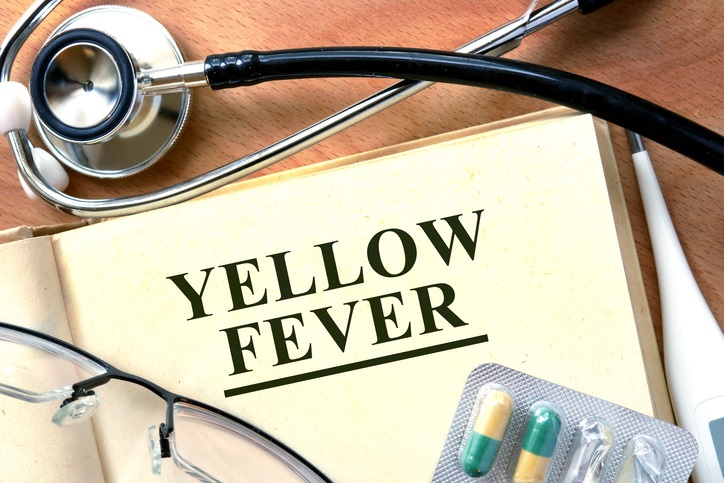Yellow fever, a virus endemic to numerous tropical regions in Africa and South America, has been a topic of discussion in the travel sphere since the CDC issued an Alert – Level 2. According to our Chief Medical Officer, Dr. William Siegart, “Since the Brazilian Ministry of Health reported an outbreak of yellow fever beginning in December 2016, health authorities have since expanded the existing list of areas in Brazil in which yellow fever vaccination is recommended. Travelers and their organizations should stay up-to-date on which areas are at risk, as well as how to prevent the virus, before travel.” Share this information and preventative advice from Dr. Siegart with your travelers before they depart to any regions affect by yellow fever.

What is yellow fever, and how is it transmitted?
Yellow fever is a virus primarily transmitted by the bite of an infected Aedes or Haemagogus mosquito. These mosquitoes feed on infected primates (human and non-human) and then transfer the virus to other primates. Some infected individuals only experience minimal to moderate symptoms following infection, while others could develop a potentially life-threatening disease.
What are the symptoms of yellow fever?
- Headache
- Fever
- Muscle Pain
- Jaundice (Yellowing of skin)
- Nausea
- Fatigue
- Vomiting
Is the virus contagious?
No, yellow fever is spread by mosquito bites and cannot be spread from person to person.
When will symptoms appear?
Most symptoms will appear within three to six days after infection. In some cases, a person may not experience any symptoms for a short period of time, but later develop an extreme case of the virus. Travelers can experience symptoms for a few days followed by a period of remission for roughly 48 hours, only to subsequently develop fulminant, life-threatening illness.
Can complications arise from yellow fever?
Yes, individuals with yellow fever can suffer from severe complications which include liver failure with jaundice, internal bleeding, heart failure, seizures, coma, kidney failure, shock and death. The CDC estimates that 20-50% of cases will result in death.
How is the virus diagnosed?
A series of simple blood tests can be used to determine if the virus is present.
What is the treatment for yellow fever?
There is no specific treatment for yellow fever at this time, but it is recommended that infected individuals are hospitalized so they can be monitored closely until symptoms improve. Doctors advise that rest and fluids are best until symptoms subside. Treatment is largely supportive, and medication may be administered to aid in symptom control, fever reduction, and pain relief.
Who should get the yellow fever vaccine?
Anyone nine months or older travelling to impacted regions should receive the yellow fever vaccination. Additionally, several countries in Africa as well as Central and South America require that you receive the vaccine and have proof of vaccination before you are allowed to visit. The CDC provides a comprehensive list of vaccination requirements and all countries currently at risk for yellow fever. Six to eight weeks prior to any trip outside of the country, travelers should schedule an appointment with their doctor or travel medicine specialist to receive the yellow fever vaccine if it’s required for their destination as well as any other required vaccinations for their trip.
When traveling to a country where the vaccine is required, how does one prove they received the vaccine?
After receiving the vaccine, individuals will be given a stamped and signed International Certificate of Vaccination Prophylaxis (“yellow card”) to prove they received the vaccination. The card will become active ten days after receiving the vaccine and is typically valid for ten years. Travelers need to present a yellow card to authorities every time they enter a new country with vaccine requirements.
Are there any side effects to the vaccine?
There is always risk of side effects with any vaccine. Redness and swelling at the site of the injection are common as well as soreness for up to a week. More severe side effects are extremely rare.
How can travelers protect themselves from getting yellow fever?
The best protection is to receive the yellow fever vaccine. Within 30 days of receiving the vaccine, there is a 99% chance of immunity against the virus. Travelers can also take extra precautions to protect themselves from mosquitoes which not only carry yellow fever, but other harmful viruses. Wear repellent that contains picaridin, IR3535, DEET or oil of lemon eucalyptus. Apply permethrin insect repellent to clothing, footwear and mosquito tents, but not directly onto skin. Cover skin with long sleeves and pants and avoid outdoor exposure. The Aedes mosquito is most active during the day, so avoid prolonged outdoor activities from dawn until dusk when possible.
Want to learn more about travel health and holistic travel risk management? Contact us today.
Safe Travels!


